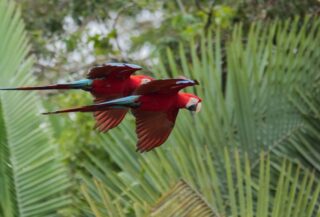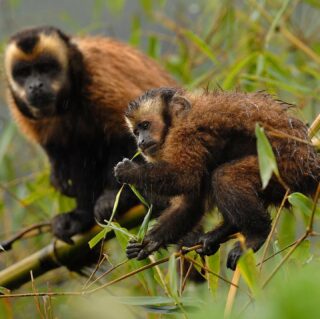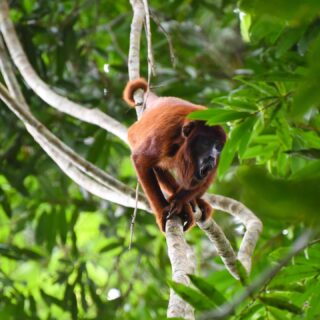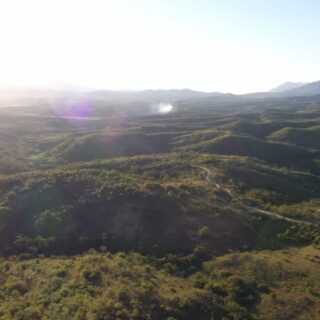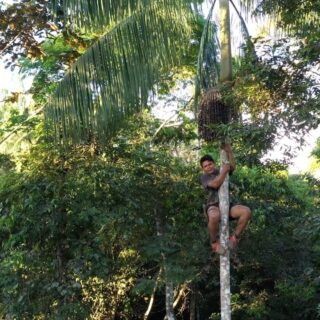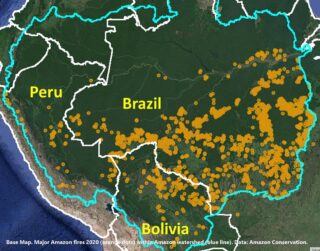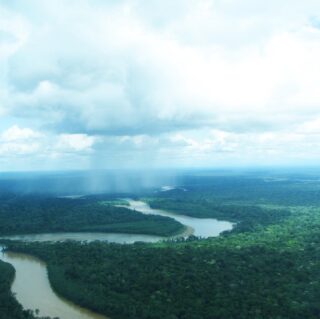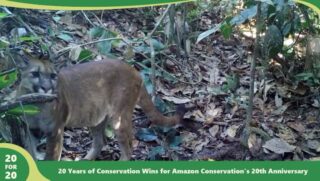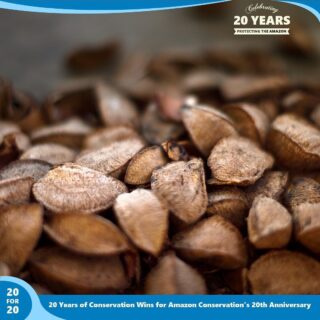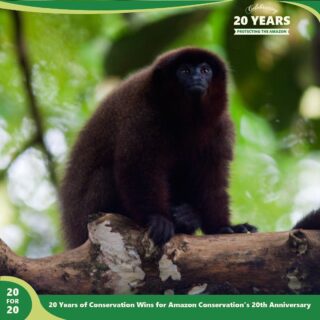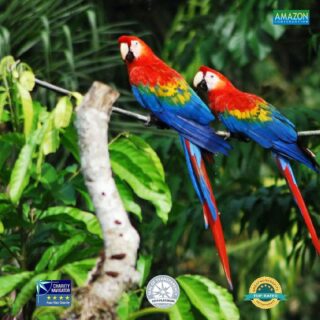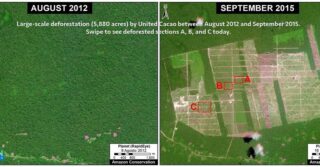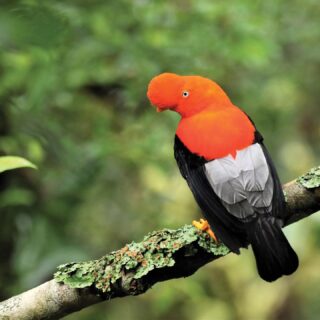GCF Task Force: Making Conservation Connections for a New Forest Economy in the Amazon
May 29, 2025
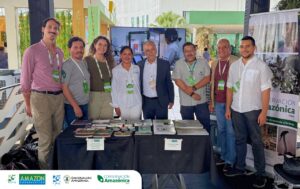 Last week, staff members from our Alliance, comprised of Amazon Conservation, Conservación Amazónica – ACCA, and Conservación Amazónica – ACEAA attended the 15th Annual meeting of the Governors’ Climate & Forests Task Force (GCF Task Force) in Rio Branco, Acre, Brazil. The event this year set up essential discussions regarding the co-construction of a New Forest Economy that strengthens forest protection, supports land restoration, and fosters sustainable economic growth and job opportunities across the region.
Last week, staff members from our Alliance, comprised of Amazon Conservation, Conservación Amazónica – ACCA, and Conservación Amazónica – ACEAA attended the 15th Annual meeting of the Governors’ Climate & Forests Task Force (GCF Task Force) in Rio Branco, Acre, Brazil. The event this year set up essential discussions regarding the co-construction of a New Forest Economy that strengthens forest protection, supports land restoration, and fosters sustainable economic growth and job opportunities across the region.
The GCF Task Force was established in 2008 to bring together a coalition of states and provinces across 11 countries to safeguard tropical forests and advance practical approaches to rural development that preserve these forests. Today, it’s the world’s largest platform for this type of subnational collaboration dedicated to tropical forest protection, consolidating a network of entities to support strong environmental governance, green financing, protection of territorial rights, and the well-being of Indigenous Peoples and local communities to strategize effective subnational, national, and international pathways for sustainable economic development that supports livelihoods and reduces deforestation.
Similar to our community-integrated approach to conservation that empowers local people, our Alliance has been working to build a forest-based economy in Peru and Bolivia for the past 10+ years, and is currently working on expanding these efforts into Brazil. We consider this approach to be one of the most effective ways to avoid forest conversion in the long term by providing economic opportunities that rely on standing forests.
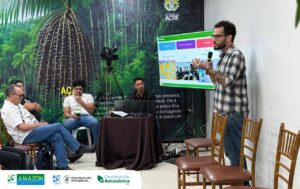 This year’s annual meeting marked an important step forward for Amazon Conservation, as our Alliance hosted a special side event called “People at the Center of Bioeconomic Transitions: Uniting Small Producers, Indigenous Peoples, and Local Communities,” to share progress updates on the development of the bioeconomy and facilitate dialogues between local producers in the Madre de Dios (Peru), Acre (Brazil), and Pando (Bolivia) regions of the Amazon. “My family lives inside the Chico Mendes Reserve here in Acre. Mother Nature feeds us, so we must treat her with care. What we need now are credit lines that actually reach our cooperatives. We discussed that capital is one of the missing pieces for communities like ours”, emphasized Vanusa Ferreira, one of the leaders at Chico Mendes Extractive Reserve.
This year’s annual meeting marked an important step forward for Amazon Conservation, as our Alliance hosted a special side event called “People at the Center of Bioeconomic Transitions: Uniting Small Producers, Indigenous Peoples, and Local Communities,” to share progress updates on the development of the bioeconomy and facilitate dialogues between local producers in the Madre de Dios (Peru), Acre (Brazil), and Pando (Bolivia) regions of the Amazon. “My family lives inside the Chico Mendes Reserve here in Acre. Mother Nature feeds us, so we must treat her with care. What we need now are credit lines that actually reach our cooperatives. We discussed that capital is one of the missing pieces for communities like ours”, emphasized Vanusa Ferreira, one of the leaders at Chico Mendes Extractive Reserve.
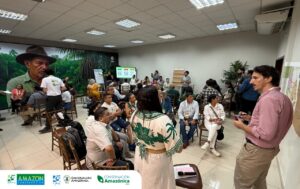 The exchange of experiences among producers of these countries sparked fresh hope and a collaborative spirit grounded in shared missions. As Manoel de Jesus, President of the Chico Mendes Extractive Reserve Association, said, “We’re going home energized. The proposals shaped here, together with partners from Peru, Bolivia, and beyond, show that when we stand united, we have a bright future.”
The exchange of experiences among producers of these countries sparked fresh hope and a collaborative spirit grounded in shared missions. As Manoel de Jesus, President of the Chico Mendes Extractive Reserve Association, said, “We’re going home energized. The proposals shaped here, together with partners from Peru, Bolivia, and beyond, show that when we stand united, we have a bright future.”
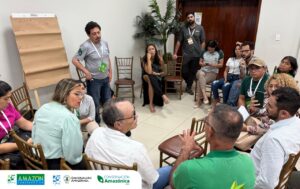 Marcos Terán, Executive Director of Conservación Amazónica – ACEAA in Bolivia, added that “bringing producers from Peru and Bolivia to share lessons in Brazil charts a common road toward a forest-based bioeconomy. The southwestern Amazon is not just productive land, it’s a climate engine. Solutions must start with local actors to get them scaled up.”
Marcos Terán, Executive Director of Conservación Amazónica – ACEAA in Bolivia, added that “bringing producers from Peru and Bolivia to share lessons in Brazil charts a common road toward a forest-based bioeconomy. The southwestern Amazon is not just productive land, it’s a climate engine. Solutions must start with local actors to get them scaled up.”
This session also included engagement from private sector company representatives and investors who have integrated investing in Amazonian organizations and/or communities that harvest forest-based products, connecting small-scale producers and Indigenous communities with potential business partners. As discussions progressed, participants reflected on the challenges of investing in cross-border supply chains and climate adaptation, exploring strategic opportunities for joint impact, and implementing best practices to strengthen sustainable development for the bioeconomy. As we aim to expand these efforts into the productive forests of Brazil, this side event acted as a key space to further boost and support local initiatives that can bolster local producers’ entrance into the global non-timber forest product market.
“A key insight from these dialogues is that increasing the value of Amazonian forest products, through integrated, internationally recognized supply chains, is vital for long-term forest conservation and for livelihoods that truly value and empower local communities,” concluded Blaise Bodin, Director of Strategy & Policy at Amazon Conservation.

